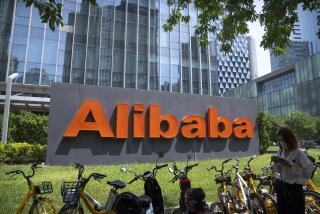Yahoo Executive, Searching for New Challenge, Signs On With Chinese Firm
- Share via
SHANGHAI — When Yahoo executive John Wu was tapped to join the fledging Chinese Internet company Alibaba.com last year, it sounded like a joke to him.
“Yahoo was doing well, my parents were immigrating to the U.S., I wasn’t seriously considering this possibility,” said Wu, the Shanghai-born, U.S.-educated former director of engineering credited with designing Yahoo’s pioneering search engine.
But on Friday, Wu was sitting on the 33th floor of a posh Shanghai high-rise, speaking as a true believer and as the chief technology officer of China’s fastest-growing business-to-business e-marketplace.
“If you compare the other leading Internet companies in China, almost all of them are copying business models already existing in the U.S.,” Wu said. “Alibaba is the only one I talked to for the simple reason the idea is original.”
The ability of a Chinese start-up to poach one of Silicon Valley’s key players could bolster China’s claim as the ultimate Internet frontier for the best minds in the industry. For Alibaba, snagging Wu was a coup that is likely to provide more firepower for the year-old Web site, which wants to become the world’s biggest online business-to-business marketplace for facilitating trade among small and medium-size enterprises.
“We did not think we [would] have the chance to get him because he is so important at Yahoo,” said Jack Ma, 36, Alibaba’s eccentric founder and energetic chief executive, who officially announced Wu’s appointment Friday. “For a first-class company, we need first-class technology. When John comes, I can sleep soundly.”
Since the two men met about three years ago, Wu has become an important advisor to Ma. Without his urging, Ma might not have acquired the domain name “Alibaba,” a word Ma said almost anyone can spell and remember.
But Alibaba.com had been claimed by a Canadian, who wanted $10,000 to relinquish it. At the time, Ma was building his business out of his apartment and paying 18 employees about $50 a month apiece to work 18-hour days. The sum of $10,000 was much more than he was willing to spend.
“But John said it was worth it; ‘Go and get it,’ ” Ma said at his China operation headquarters in Hong Kong.
Now, after just a year, the company has more than 150,000 registered members from 188 countries. It has Chinese branch offices in Shanghai, Beijing and Hangzhou, and other branches in Seoul, London and Silicon Valley. Behind it are such powerhouse investors as Goldman Sachs & Co. and Softbank Corp.
Wu was one of the first people Ma called after securing $20 million from Softbank in January. They met at a cafe across from Yahoo’s Santa Clara, Calif., office and seriously discussed Wu’s joining Alibaba. The prospect of having his pay cut in half was not the most vexing factor influencing his decision, Wu says; the idea of uprooting his family was. To make the decision easier, Ma offered him the option of staying in Silicon Valley. Alibaba is opening a research and development center in Fremont, and Wu will be based there.
“I always wanted to do something for the high-tech industry in China,” Wu said. “If I don’t have to relocate and still work for one of the best Internet companies, it seems like a perfect opportunity.”
But what really turned Wu’s head was Alibaba’s business model. In a Chinese climate of frequent imitations based on U.S. formulas, it’s refreshing to see a company innovate according to the needs of the local business culture, Wu said.
“In the U.S., big business dominates,” he said. “Small and medium-size businesses are not as important. That’s completely different in Asia. There are lots of small and medium-size businesses.”
These buyers and suppliers need access to other buyers and suppliers around the world. But they usually can’t afford to travel and set up satellite offices. Ma saw the need to provide them with information and access to the global marketplace. His company plans to trade U.S. shares on Nasdaq by year’s end.
Ma came up with the model while working at the Ministry of Foreign Trade and Economic Cooperation, where he came in contact with many local businesspeople. One thing he learned was that many enterprises lack information and access to each other.
“There are a lot of Internet companies started by people who studied in the U.S. and came back to China,” Wu said. “Jack Ma is different. He has been in China all his life. It’s impossible for MBAs from Harvard to see these opportunities.”
Ma stands out, Wu said, because unlike many foreign Internet entrepreneurs, he doesn’t hold Ivy League credentials. But he nonetheless is a regular on the conference circuit, entertaining crowds with his rapid-fire English like a sound-bite machine. A onetime English teacher, he started to learn the language when he was 12, chatting up foreign tourists every morning before he went to school in his hometown, Hangzhou.
“No, I did not get an education from Harvard,” Ma said Friday after a talk at a global economic forum in Shanghai. “I went to Harvard to educate them.”
That’s the spirit that makes Alibaba an irresistible challenge for the Yahoo veteran.
“I have worked for Yahoo for four years. Whatever I can contribute I already have,” Wu said. “Yahoo’s search engine has shaped the way millions of people surf the Internet. Now Alibaba’s e-commerce platform will fundamentally change the way people conduct business online.”






